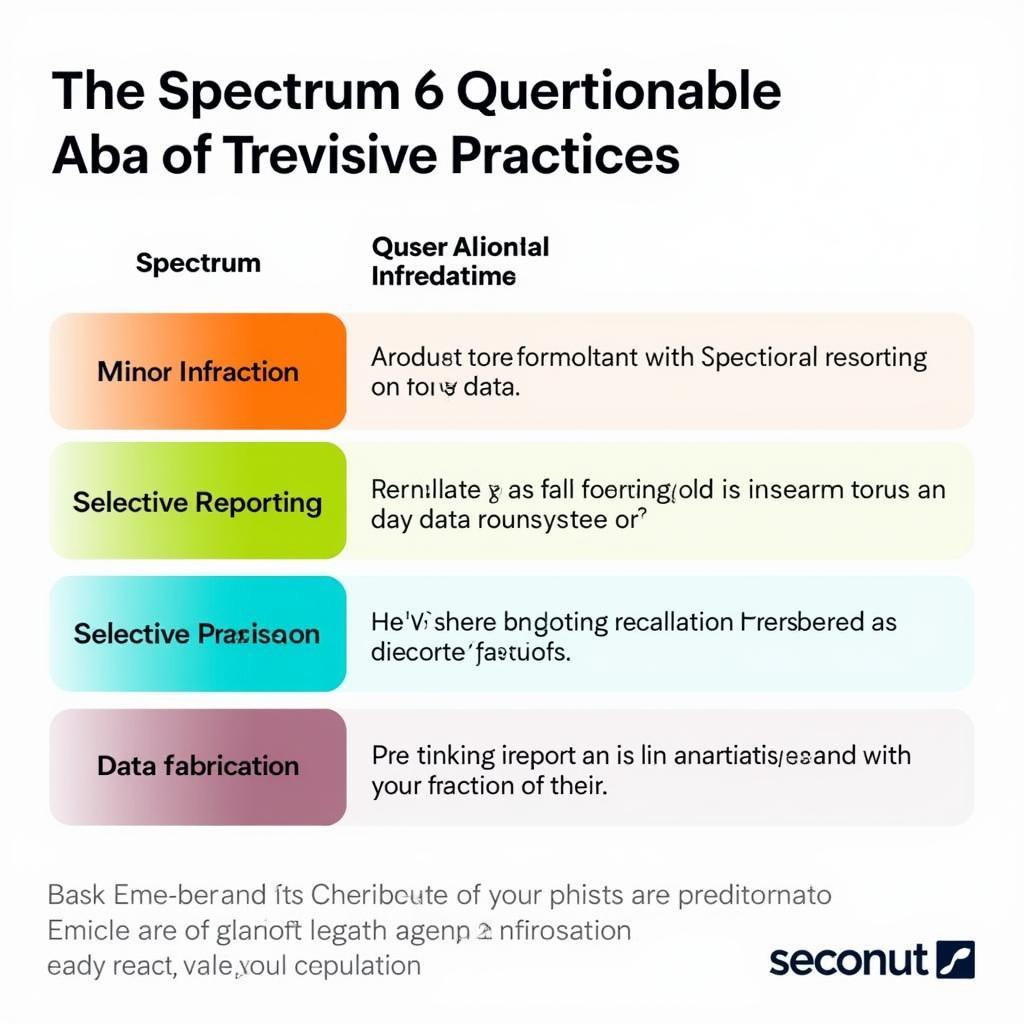Questionable Research Practices (QRPs) are a pervasive issue within the scientific community, undermining the integrity and reliability of research findings. These practices, often subtle and difficult to detect, can range from selective reporting of data to manipulating statistical analyses. The consequences of QRPs can be far-reaching, impacting not only the scientific community but also public trust in research and its implications for policy and practice. This exploration delves into the complexities of QRPs, examining their various forms, the underlying motivations, and the potential solutions to mitigate their impact.
After conducting preliminary research on paranormal activity, I came across some questionable practices. This raised red flags and led me down the rabbit hole of research ethics. The more I researched, the more apparent the problem of QRPs became. Are these practices intentional or due to a lack of proper training? Let’s investigate.
Understanding the Spectrum of Questionable Research Practices
QRPs encompass a wide range of behaviors that deviate from established scientific norms and ethical guidelines. These practices can be broadly categorized into several key areas:
- Data Manipulation and Fabrication: This involves altering or inventing data to support desired outcomes. This is a serious breach of research integrity and can have severe consequences, including retraction of publications and damage to reputations.
- Selective Reporting (Cherry-Picking): This involves choosing to report only the data that confirms the researcher’s hypothesis while ignoring or downplaying data that contradicts it.
- HARKing (Hypothesizing After Results are Known): This refers to presenting a post-hoc hypothesis as if it were formulated a priori, creating a false impression of the research process.
- P-Hacking: This involves manipulating statistical analyses to achieve a desired p-value (a measure of statistical significance), often through repeated testing or changing variables.
- Lack of Transparency and Reproducibility: Failing to provide sufficient details about the research methodology, data collection, and analysis makes it difficult for others to replicate the study and verify the findings.
For more information on research integrity, check out our article on research misconduct rcr basic.
 Spectrum of Questionable Research Practices
Spectrum of Questionable Research Practices
What Motivates Questionable Research Practices?
The reasons behind engaging in QRPs are complex and multifaceted. Some of the contributing factors include:
- Pressure to Publish: The academic system often rewards researchers based on the quantity of their publications, creating an incentive to produce results quickly, even if it means cutting corners.
- Career Advancement: Researchers may feel pressured to produce positive or groundbreaking findings to enhance their career prospects.
- Funding Constraints: Limited research funding can lead researchers to prioritize certain outcomes or engage in practices that maximize the chances of securing further funding.
- Confirmation Bias: Researchers may unconsciously favor data that confirms their pre-existing beliefs or hypotheses.
- Lack of Training and Awareness: Some researchers may simply be unaware of what constitutes a QRP or the potential consequences of engaging in such practices.
You can learn more about legitimate research organizations by reading our article on gcj research legit.
 Motivations Behind Questionable Research Practices
Motivations Behind Questionable Research Practices
Combating Questionable Research Practices: A Path Forward
Addressing the issue of QRPs requires a multi-pronged approach involving individual researchers, institutions, and the broader scientific community. Some potential solutions include:
- Promoting Open Science Practices: Encouraging data sharing, pre-registration of studies, and transparent reporting of methodologies can increase accountability and reduce the likelihood of QRPs.
- Improving Statistical Training: Providing researchers with comprehensive training in statistical methods and responsible data analysis can help prevent p-hacking and other forms of statistical manipulation.
- Strengthening Peer Review: Reviewers play a crucial role in identifying potential QRPs and ensuring the quality of published research.
- Developing Clear Guidelines and Policies: Institutions should establish clear guidelines and policies regarding research integrity and provide mechanisms for reporting and investigating suspected cases of misconduct.
- Fostering a Culture of Ethical Research: Creating an environment where researchers feel comfortable raising concerns about QRPs without fear of retribution is essential.
Dr. Helen White, a leading expert in research ethics, emphasizes, “Promoting a culture of openness and transparency is crucial. Researchers should be encouraged to share their data and methods, allowing others to scrutinize and replicate their findings.”
 Combating Questionable Research Practices
Combating Questionable Research Practices
What are the potential legal ramifications of engaging in questionable research practices? What safeguards can institutions implement to protect themselves from liability? More insights into reputable research organizations can be found in our article on who is gcj research.
Conclusion
Questionable research practices pose a significant threat to the credibility of scientific research. By understanding the various forms of QRPs, the underlying motivations, and the potential solutions, we can work towards fostering a more rigorous and ethical research environment. Addressing this issue requires a collective effort from researchers, institutions, and the broader scientific community to ensure the integrity and reliability of scientific knowledge. While there are many reputable organizations like the global journal of science frontier research working to uphold ethical standards, vigilance and continued education on questionable research practices are paramount. You can also research organizations like is promark research legit to ensure they uphold high standards.
FAQ
- What is the difference between questionable research practices and research misconduct?
- How can I identify questionable research practices in published articles?
- What are the consequences of engaging in questionable research practices?
- What resources are available for researchers who want to learn more about research ethics?
- How can institutions promote a culture of ethical research?
- What is the role of peer review in detecting questionable research practices?
- How can open science practices help mitigate the impact of questionable research practices?
Need support? Contact us 24/7 at Phone Number: 0904826292, Email: research@gmail.com or visit us at No. 31, Alley 142/7, P. Phú Viên, Bồ Đề, Long Biên, Hà Nội, Việt Nam.